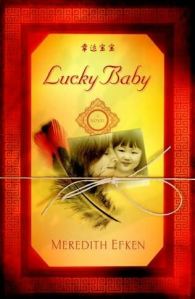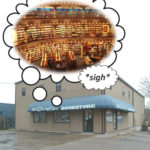Magic Realism, Part 2

“What if I promised you that you would be able to see clearly all the way to where the earth and heaven meet?”
I peered up at it. When I looked at it, I saw clearly. When I looked away, all was dark again. But I had not lived my life as an orphan for nothing. I did not give my trust easily. “Why should I want to see that?”
“Why should you want to miss it?” The creature scolded me with a hiss. “You are asking the wrong questions, Wen Ming. You have not asked who I am or why I call to you.”
“I think you are an evil spirit.”
“Or I might just be your imagination. Since your world is so small, I suppose you don’t have much else to do other than create monsters in your mind.”
— Lucky Baby, by Meredith Efken (Howard Books, 2010)
Not only are there monsters in the mind, there are hopes and dreams. There are struggles and desires we dare not name. Do we impose a tidy package of carefully constructed beliefs in order to exercise a form of divination upon our unexplainable moments—this must mean that?
All too often. But by doing so, do we not risk stepping into the place of God, the Author and Finisher of our faith?
It’s impossible to know the “thing in itself.” All our perception of phenomena is characterized, conformed, and clouded by our humanness. For instance, try to conceive the edge of the universe, and what’s beyond. Weird, huh, being caught within time and space?
— Marc Schooley
Inconceivable, as a vertically-challenged villain was once known to say. Yet we bring all our perception of phenomena to bear on such far-flung fields as paleocosmology, and dare to state that our perceptions are authoritative, insofar as they confirm the representational cloud of smoke in which we prefer to subsist. (Would you quit blowing that in my direction.)
At the same time, we miss the “thing in itself” all around us, every day. For instance, we look at a loved one, but do we see that person or the representation we’ve built of them through years of knowing?
— C.L. Dyck
From Pipe Dreams (Schooley/Dyck)
Christian fiction derives its cultural acceptability from its coherence with a set of beliefs—and relies on the idealistic assumption that the set of beliefs invoked is, in essence, a good and sound set of beliefs. Importantly, that framework is not transcendent, nor is its coherence particularly with the biblical; it’s based on what’s acceptable to the broadest possible segment of the evangelical/religious-leaning reading market.
Problem: As I mentioned, perception is broken. As we shape our awareness of this problem, Christian writing is constantly under change. Postmodernism has been a popular response—oh well, close enough, as long as enough people like it and can interpret it in their own way.
Alternately, we can use our art to examine our sense of perception. In the post quoted above, my writing partner and I took a nonfictional stroll through established philosophy on the matter. These are problems that have been tackled before from within the Judeo-Christian worldview, if we care to look beyond the New World and its aggressive divorce from the Old. To create a similar examination in a fictional environment, though, requires not analysis but a propositional approach, as I’ve written over at the editorial blog. One of the biggest reader-side stumbling blocks I see to Christian speculative fiction is the constant audience demand for analysis at the expense of purely propositional writing.
There are things we see that aren’t there, just as there are things out there that we fail to see. There are things we wish to see that cannot be; just as things can be, though we wish they were not so. Magic realism attempts to encapsulate this phenomenon through exaggeration: can a 243-year-old man die for lack of shoes?
Magic realism allows for correspondence to define the truths within the world of the story. “This is an accurate description of the event, whether or not it seems believable; therefore, this description corresponds with truth.” Even if that truth is a spiritual thing, embedded halfway in and halfway out of the broken machinery of perception, we count on the reliability of perception, not its deceptiveness, to stand in the gap. I saw it; therefore, in some way, it must be.
Magic realism’s symbolic context arises from within the text, unlike allegory, whose context arises from outside the text. We spend all too much time, I would argue, in imposing our outside sense of meaning onto the narratives we encounter: whether Tolkien or the biblical account, we are determined to see what we wish to see. This is not true interpretive reading. Rather, it bespeaks a lack of confidence in raw perception, as if we cannot see without a lens machinery locked into place between ourselves and the world.
One example of magic realism is when a character in the story continues to be alive beyond the normal length of life and this is subtly depicted by the character being present throughout many generations. On the surface the story has no clear magical attributes and everything is conveyed in a real setting, but such a character breaks the rules of our real world. The author may give precise details of the real world such as the date of birth of a reference character and the army recruitment age, but such facts help to define an age for the fantastic character of the story that would turn out to be an abnormal occurrence like someone living for two hundred years.
Remind you of anything?
Should we interpret? I’d argue we can’t exist as rational beings without interpreting the world around us. Just as over-interpretation lands us in a self-made box, refusing to interpret leads to a morass of deliberate non-knowing. It’s a way of checking out of the responsibility to love the Lord your God with all your…mind, among other aspects of the commandment. And eschewing interpretation is in fact a form of imposition. It imposes the notion that inherent meaning cannot possibly exist.
The problem arises when we decide, my interpretation/imposition is all there is. Or worse, my interpretation/imposition makes me happy. Yours may be different, but it doesn’t matter as long as you’re happy too.
By the act of interpretation—or avoiding it—do we reveal ourselves. Our complacencies, our comforts, our personal points of arrogance and indifference. Here, story becomes truly powerful, a sort of Sentience Engine deliberately designed to fracture our lens machinery and poke us in the eye. If the thing that differentiates man and animal is the soul—awareness of self—then story is the mystical machine that sifts our awareness and places us under examination. This reversal of the roles we had in mind is not necessarily comfortable, but that doesn’t mean it isn’t good.
When that poke in the eye is delivered, we may find ourselves somewhere we’ve never imagined. Because life, too, has an Author and a story, and it behooves us to turn the page.
Cathi-Lyn Dyck has been a published writer and poet since 2004, and a freelance editor since 2006.
She can be found online at ScitaScienda.com.









































My first thought when the article started talking about not seeing things as they really are.
“How can we be outside the universe?”
“Imagine one of those soap bubbles with a tiny bubble clinging to the side.”
“Okay.”
“But don’t, cause it’s nothing like that!”
–Eleven and Amy, The Doctor’s Wife.
Magic realism does the same sort of thing with our world.
Dr. Who: providing pithy accessibility to the indescribable at every turn. 🙂
I’m really honored to have my book referenced in such an erudite discussion of magical realism and philosophy. Thank you so much!
Your quote:
“There are things we see that aren’t there, just as there are things out there that we fail to see. There are things we wish to see that cannot be; just as things can be, though we wish they were not so. Magic realism attempts to encapsulate this phenomenon through exaggeration…”
This is a really good way to describe it. As I was writing Lucky Baby the “magical realism” elements grew out of the sense I had that the emotions I was trying to capture and express were too deep, too present, to be described in an intangible way. Allowing them to be expressed by the fantastical let me reveal those emotions and experiences in a new way to the reader.
The quote you used from my book above is from the moment that the character, Wen Ming, loses her remaining sight forever. Framing that as a mystical interaction with a monster–who takes her sight from her even while he gives her a new view and perspective–let me freeze the story at that moment and magnify it. So the truth of that scene isn’t whether or not the monster was “real” or a “dream/vision.” The truth is in the experience of a child losing her remaining eyesight and at the same time seeing her life and her future in a new way. The fantastic elements bring attention to that real truth by creating a scene that isn’t real or possible, and then refusing to admit that it possibly could be just fantasy.
I once read that magical realism elevates the everyday moments of life to something magical, while at the same time making the fantasy/magical elements in the story completely mundane. To me, the whole point is to remind the readers, and ourselves, that the experience of living–each unique moment, each human emotion and thought and revelation–is in itself miraculous…and dare I say it, magical.
You are so very welcome! It’s a delight to have such a rich passage to give as an example.
Yay! I’m so glad you said this. 🙂 It ties in with something I learned from reading Stephen King’s On Writing: I look at the world through a magic realism lens, so it’s no surprise I gravitate to that kind of storytelling.
I’m currently reading The People of the Mist by Rider Haggard. I find that reading books from other eras challenge my perceptions just as well as reading fantasy from modern authors, if not more. People in other eras thought about different things in different ways, and it makes me see my life in a new light.
“Those who have lived much with nature will in some degree be familiar with such sensations, for man and nature are ever at variance, and each would shape the other to its ends. In the issue nature wins. Man boasts continually of his conquests over her, her instincts, her terrors, and her hopes. But let him escape from out his cities and the fellowship of his kind, let him be alone with her for a while, and where is his supremacy? He sinks back on to her breast again and is lost there as in time to be all his labours shall be lost. The grass of the field and the sand of the desert are more powerful than Babylon; they were before her, they are after her; and so it is with everything physical and moral in their degrees, for here rules a nurse whom we human children must obey at last, however much we may defy her.”
Kessie, that quote puts a shiver down the back of my neck. I’d say “epic,” but our urban technological paradigm has “tamed” that word along with nature…
Still, I think that outside sense of meaning which shapes our interpretation isn’t completely useless. We may be the blind men evaluating the elephant, convinced that it’s like a snake, or a wall, or a rope…and those interpretations all convey some measure of truth. Of course, it’s better to understand the elephant as an elephant.
There’s certainly a tendency to work so hard to accommodate everybody’s viewpoint that the idea of an objectively knowable truth about anything falls by the wayside. And, as you go on to explain, our interpretation may reveal more about ourselves than about the truth of what we’re trying to interpret.
Wonderful article, Cat.
Thank you, Fred.
Yes indeed. We are so bogged down in the postmodern dialectic that we tend to completely forget (or assume to be forgotten) the modernist paradigm of truth and perception–a very different thing than the postmodern.
[…] Magic realism 2 […]